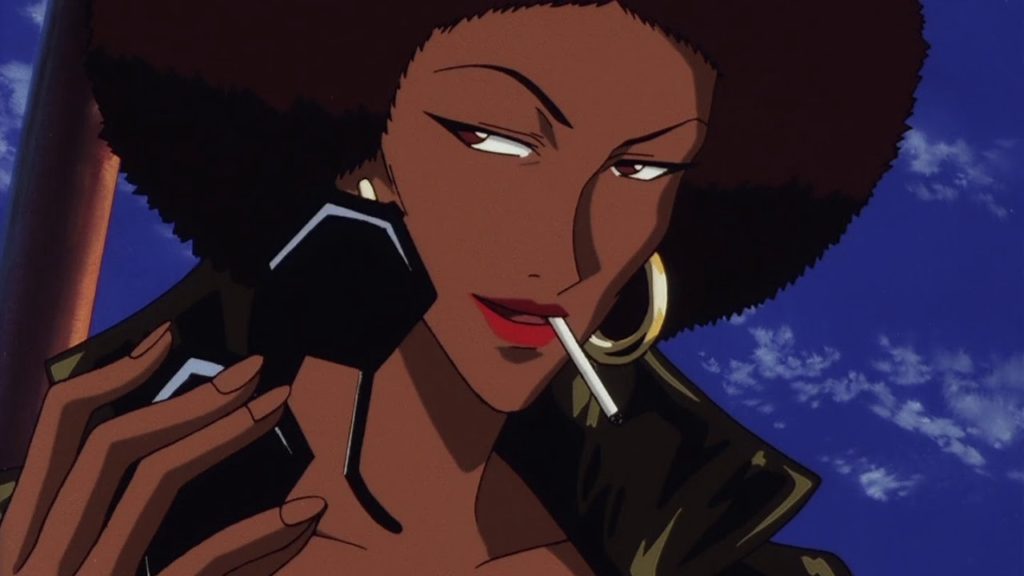Session 17: Mushroom Samba
For one month, The Dot and Line is publishing essays, interviews, and discussions about each episode of Cowboy Bebop, which turns 20 this April.
Music is the backbone of Cowboy Bebop’s mass appeal, both in the titular musical reference speaking to the show’s ambient, unpredictable rhythm and in the amazing soundtrack. Still, as a fan of the show, and of anime in general, I get thrown from that groove at the sounding of a tired blue note that seemingly plagues even anime of this high a quality: racial stereotyping.
That note sounds loudest in the show’s 17th session, “Mushroom Samba,” which, for all its charm, brings to mind the troubling question of representation in anime. The session starts out solidly enough as it unravels the mystery of who ate the crew’s rotten spoils. (It turns out it was the girl known to be spoiled rotten. Who knew?)Which is a sensible start — Bebop is at its best and most universally approachable when centers its story around its dysfunctional family. Then, as the narrative shifts its focus to Ed and Ein as they hunt for a suspicious mushroom dealer, what starts as simply a wacky adventure runs smack into what remains a depressingly common problem in anime.
The first blue note sounds when Yoko Kanno’s composition “Chicken Bone” starts playing — a funky, almost TLC-esqe ode to a stereotype about black people’s diets. Soon after, we see Coffy, a leather clad, afro laden vixen of a bounty hunter on the job. She is sly, exoticized, and privy to using her feminine wiles to suit her monetary goals. Her sex appeal is treated as being as important to her identity as the watermelon she buys in the scene: note that the police officer lugged it over to her later interrogation.
Later on, when the belligerent Shaft shows up, aiming to use violence and vengeance to solve his emotional strife, I could almost hear Samuel L. Jackson slapping fools over Isaac Hayes in the background. Finally, we have the bounty of the episode. Domino Walker, the morbidly obese Jamaican drug dealer, shows up, alternating between nonchalant stereotype and vaguely immoral shyster. I quickly realized that this is another one of those “homages” anime creators seem utterly unable to stop making.
Mushroom Samba juxtaposes the show’s Western and noirish inspirations with the tenets of blaxploitation, the distilling of black culture down to simplistic tropes for an onlooker’s mild entertainment. The use of black culture as set dressing or as shorthand for “cool but inferior,” hidden behind the oblivious reverence of an homage, is frequent in anime. Any black anime fan has grown accustomed to seeing uncomfortable representations of themselves. Remember Kami’s docile, big lipped, ebony manservant Mr. Popo in Dragon Ball Z? Because black people do.
The episode also represents one of the writ large themes of the series: distance from others. It’s a theme that fits in all too well with the history of blaxploitation. To be fair, the creators of the show clearly have some real admiration for black people and the things they produced; just look at the name of the series, and the clear references to the works of Pam Grier and Richard Roundtree in this plot.
Still, there is an enduring distance, that sense that Coffy, Domino Walker, and Shaft are aliens to be watched from afar. This is no clearer than when considering Radical Edward’s decidedly un-radical response to these new characters. Sure, Ed is always marching to a beat no one else can hear, her bemusement at the sight of these walking stereotypes fits only too well with the anime’s slighting of them.
As the episode winds away from the stories of the black characters and back to the crew of the Bebop as they come down from tripping balls on magic mushrooms, the presence of an entirely “normal,” safely acceptable black police officer at the end of the episode feels perfunctory. “Here ya go, black viewers…a normal one. See, we’re down,” the show seems to say. But it’s too little too late. Here I am again, jinxed by bad representation. (Remember Jynx from Pokémon? Yeah. Anyway…)
I realize the folly in looking at 20-year-old works with the outrage of the Wakanda-branded glasses of contemporary racial politics. I also acknowledge the dangers of editorializing on the supposed malevolence of Studio Sunrise when depicting people of color, when it may be as simple as Japanese people’s only ideas of black Americans coming from the flawed representations of them in America’s own television and film outings. Still, I can’t help but hope for a day that heralds better representation in all of anime — nor can I help but expect better from the rhythms and blues of a show like Cowboy Bebop.
Thanks for reading The Dot and Line, where we talk about animation of all kinds. Don’t forget to for this article and follow us on Twitter and Facebook.
